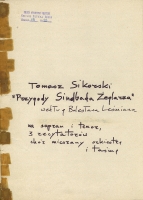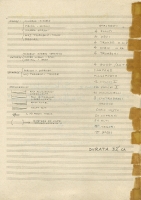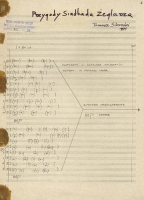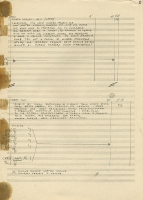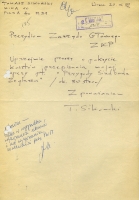The Adventures of Sinbad the Sailor – radio opera (1971)
The libretto of Tomasz Sikorski’s radio opera The Adventures of Sinbad the Sailor comprises excerpts from the initial chapters of Bolesław Leśmian’s book with the same title. The piece ends with Sindbad being driven out from the island of Princess Pirusa and with his return to Bagdad. The excerpts were chosen by Natalia Sikorska, the composer’s wife. She managed to create a short, compact and self-contained text brilliantly corresponding to her husband’s artistic personality and containing many threads referring directly to him. Thus Sinbad’s story becomes a tale of Tomasz Sikorski. Loneliness, wandering, a sense of rejection, doubting in the value of his work and regret at being underestimated were all issues that increasingly plagued the composer. Themes like silence, death (dying down, becoming still), manuscripts and bells would appear also in many of his later compositions, becoming increasingly dark. Paradoxically, the pessimistic vision of his own existence finds its expression in a joyful tale of a traveller in search of happiness.
Unlike Leśmian’s book, the opera does not begin with the words ‘My name is Sinbad’, but with a letter from the Sea Devil, in which he encourages the world-weary young man to leave his riches and his palace, and throw himself into a whirlwind of adventures. The letter also appears in the opera’s ending, giving the audience to understand that the eponymous hero will soon succumb again to the temptation of setting off into the unknown.
Despite its subject matter – completely alien to Sikorski, it would seem – the music of The Adventures of Sinbad the Sailor fits in perfectly with his compositional idiom. In fact, the work has little to do with opera as a work for the stage and with opera for the radio. It is more of a radio drama. Most parts are spoken (often without music) and singing appears only twice. In its expression the music emphasises the fantastic nature of the world presented, which seems unreal or oneiric. It evokes an anxiety that is difficult to describe: both absorbing and paralysing, in a word – hypnotising. Yet it is far from being mere illustration.
The Polish Radio recording departs significantly from the 1971 version of the score. The changes are mainly about reducing the musical layer, while the spoken parts are often expanded, which shifts the work’s centre of gravity towards the spoken word. However, the reduction of some intermezzo-like fragments as well as the introduction of several new threads into the text did improve the flow of the narrative.
Wiesław Opałka, a very experienced and highly valued director of many radio dramas, a man with an excellent sense of timing and exceptional ability to shape the form, produced an intriguing combination of an original and evocative music with a text that was only seemingly incompatible with it. The result turned out to be unique not only in the context of Sikorski’s entire output. We must also mention excellent performances by distinguished Polish actors, especially Gustaw Holoubek in the leading role.
Tomasz Sikorski also planned to write music to a ballet based on The Adventures of Sinbad the Sailor. The plans came to nothing, however.


